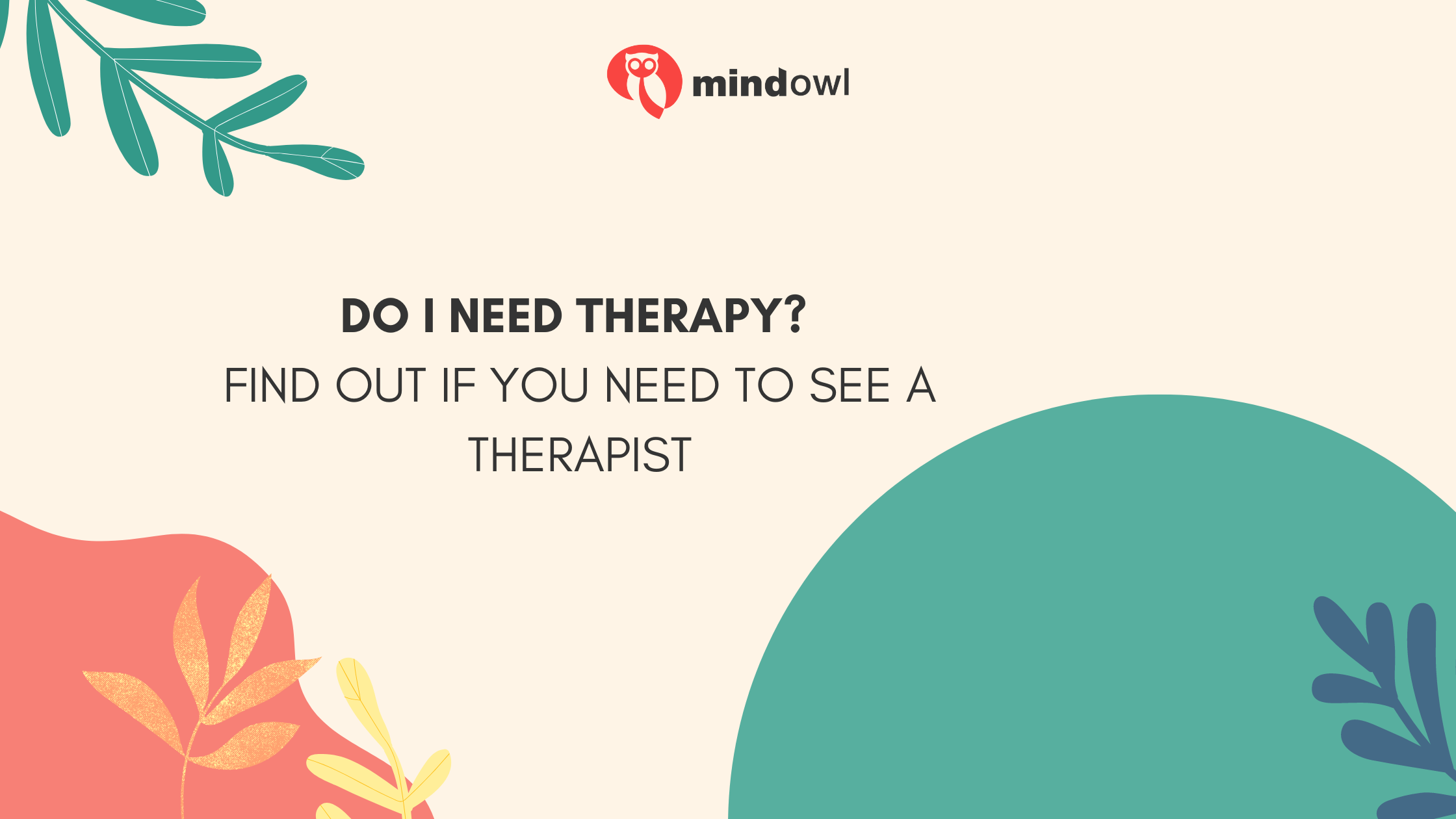Feeling stuck or overwhelmed can be a common part of life. Yet, when these feelings linger and start to affect your day-to-day activities, it might be time to consider seeking help.
If you’re pondering whether therapy could be the right step for you, know that you’re not alone in this thought.
Therapy offers a space to talk through thoughts and emotions with a trained professional, aiming at the improvement of mental health and emotional well-being. This article provides information on signs indicating it might be beneficial for you to see a therapist—from struggling with daily tasks due to mood swings to lacking support in challenging times.
With practical advice on overcoming hurdles such as finding the right therapist or managing costs, we aim to guide you towards making an informed decision about pursuing therapy.

Signs That You May Need Therapy
Difficulty functioning in daily life
Struggling to function in your daily life is a key sign you might need to seek therapy. Maybe getting out of bed feels like climbing a mountain, or your job tasks seem impossible. Your performance at work or school could take a hit, leaving you feeling even more frustrated and stuck.
It’s tough when everyday things feel overwhelming.
A decrease in performing everyday activities can indicate that it’s time to consider help from a mental health professional.
People often notice changes in their appetite or engage in risky behaviour without understanding why. These are signals that something deeper could be affecting your mental state. A good therapist can provide the support and tools needed to handle these challenges, improving your ability to cope with life’s curveballs.
Feeling apathetic, losing interest in hobbies, and preferring isolation over social interaction are also warning flags. Therapy offers a space for emotional release and skill development — key steps toward regaining control over your emotions and actions.
Experiencing persistent or intense emotions
Feeling angry or sad all the time can be hard. Therapy helps people understand these strong feelings that come from stress, trauma, or issues with others. Sometimes, physical health problems happen for no clear medical reason.
This might mean emotional issues are affecting someone’s body. Talking to a mental health expert like a psychologist can make things better.
For those dealing with such emotions regularly, considering therapy is a wise step. It’s not just about talking; it’s also learning how to manage these feelings in healthier ways. Cognitive behavioural therapy and mindfulness can help calm the mind and improve overall well-being.
Finding the right therapist takes time but is vital for healing and moving forward positively in life.
Struggling with a mental health condition
Half of all mental health conditions start by age 14, and three-quarters have begun by age 24. This shows how early these challenges can appear. Conditions like schizophrenia or bipolar disorder don’t just pop up out of nowhere.
Therapy may be a good path if your condition is getting in the way of your daily life.
Finding the right type of therapy can be a big help. Cognitive behavioural therapy, family therapy, and couples therapy are some forms to consider. Each has its own way of dealing with stress, anxiety, major depressive disorder, and other serious mental health issues.
Talking to a licensed mental health provider about your symptoms is a key step towards feeling better. They can guide you through coping strategies that make day-to-day living easier.
Facing a major life change or loss
Life changes and losses hit hard. They shake up your world like nothing else. Whether it’s losing someone close, dealing with a breakup, or facing big shifts in life such as moving cities for a job — these events test you.
You might feel lost, scared, or deeply sad. It’s natural to struggle during these times. Seeking out grief counselling can help you manage through this storm.
Finding the right therapist becomes essential when you’re trying to cope with such profound changes or loss. Therapy provides a safe space where you can express your feelings without fear of judgment.
It helps improve your mental health by teaching coping skills for dealing with loss and change effectively. Therapists and counsellors offer support that enables you to understand and work through your emotions at your own pace, helping to make sure the healing process is on track.
Limited support from friends and family
Not having enough support from friends and family can make someone feel very alone. This might be a hint that seeing a therapist would help. Sometimes, even when people try to talk about their problems with loved ones, they don’t get the helpful feedback they need.
In such cases, therapy could offer the listening ear and understanding missing in their lives.
Therapy sessions provide a safe place to share personal feelings without judgment. A mental health counsellor or psychotherapist listens and helps individuals work through their emotions and challenges.
Unlike brief conversations with friends, therapy digs deeper into someone’s experiences, offering coping strategies that foster emotional health. Finding the right therapist might be the step needed towards healing and wellbeing for those feeling isolated or misunderstood by those around them.
Benefits of Seeking Therapy
Validation and understanding
Therapy offers a unique space for validation and understanding, key pillars in the journey towards mental well-being. The American Psychological Association highlights how vital these aspects are within evidence-based psychotherapy.
In therapy sessions, your feelings and experiences get acknowledged as real and significant. This recognition itself can be profoundly healing. Imagine a scenario where you finally feel heard after years of internal struggle—this is what therapy aims to provide.
A therapist doesn’t just listen; they understand from a professional standpoint, bringing insights from extensive research on psychiatric conditions into each session. They guide you through cognitive behavioural therapy or psychodynamic therapy, depending on what suits your needs best.
It’s not about offering sympathy but about empowering you with strategies to navigate life more effectively. As someone once said:.
The greatest gift of therapy is the feeling that you are no longer alone in your thoughts.
This approach does more than just make you feel better; it equips you with the tools needed for resilience against future challenges, fostering psychological resilience—a fundamental component in managing stress (biology) and overcoming mental distress.
Objective perspective
A therapist gives you an outside view of your world. They see things differently than friends or family might. This objective viewpoint helps spot patterns or issues you might miss.
Therapists use evidence-based strategies, like cognitive behavioural therapy, to help you understand and heal yourself. Good therapists always focus on making sure their care fits your needs perfectly.
Getting this sort of perspective can be a game-changer. It allows for real progress in areas where one may feel stuck, whether it’s dealing with mental health challenges such as depression or anxiety, managing stress from life changes, or looking for ways to improve emotional well-being.
Their role is to guide thoughts in new directions that promote healing and growth without passing judgment.
Skill development
Therapy can aid in skill development by helping individuals enhance their coping mechanisms, interpersonal communication, and emotional regulation. Acquiring these skills enables better management of life challenges and fosters resilience.
Evidence-based psychotherapies have shown effectiveness in supporting the acquisition of these skills, empowering individuals to navigate through various mental health concerns with competence and confidence.
Furthermore, therapy provides a platform for developing problem-solving strategies, assertiveness, self-awareness, and stress management techniques. These foundational skills contribute significantly to improved overall well-being and mental health outcomes.
The acquisition of such abilities equips individuals with essential tools to address cognitive distortions, cultivate healthy relationships, manage conflict constructively, and effectively seek support when needed.
Emotional release
Evidence-based psychotherapies, offered by various healthcare professionals such as psychologists and physicians, are effective for experiencing emotional release. These therapies prioritise patient preferences and emphasise fidelity to core components to enhance outcomes.
Seeking therapy can lead to a beneficial emotional release, helping individuals cope with overwhelming emotions in a supportive environment, thereby promoting mental well-being. Additionally, engaging in therapy can provide a healthy avenue for expressing and processing intense emotions.
Therapy offers an opportunity for individuals to release pent-up emotions in a safe setting, leading to better mental health and improved daily functioning. By integrating evidence-based psychotherapies into treatment plans, individuals can access the skilful support of therapists while achieving emotional relief from persistent or intense feelings.
Seeking therapy is essential for those who may find it challenging to navigate difficult life changes or losses without professional guidance and support.
Setting achievable goals
Therapy involves collaborating with a therapist to set realistic and attainable goals that contribute to personal growth and improvement. Achieving these goals with the support of therapy can lead to significant development in various aspects of life while enhancing mental well-being.
The different approaches tailored by therapists are designed to assist individuals in identifying, setting, and working towards achievable goals, ultimately leading to positive outcomes.
Setting actionable objectives within therapy can be instrumental in addressing specific concerns and making tangible progress towards improvement in mental health.
By engaging with a therapist, individuals have the opportunity to gain valuable guidance and support in establishing achievable goals that align with their desired outcomes. Therapy provides a structured environment for exploring possibilities, overcoming obstacles, and making meaningful strides toward personal growth.

Navigating Barriers to Therapy
Dealing with financial limitations when seeking therapy can be challenging. Accessing community resources and discussing your concerns with a primary care physician can provide alternative options for support.
Financial limitations
Financial limitations can be a significant barrier to accessing therapy. Here are some strategies to overcome this obstacle:
- Explore low-cost options, such as community mental health clinics or non-profit counselling centres, which may offer sliding-scale fees based on income.
- Understand insurance coverage and seek therapists who accept your insurance plan to mitigate out-of-pocket expenses.
- Utilise Employee Assistance Programmes (EAPs) if available through your workplace, which often provide short-term counselling at no cost.
- Consider online therapy platforms that may offer more affordable rates compared to traditional in-person sessions.
- Look into university counselling services for students, which typically provide reduced-cost or free therapy sessions.
These approaches can help individuals with financial constraints access the support they need without breaking the bank.
Lack of insurance coverage
Many people are unable to access therapy due to lack of insurance coverage. This can pose a significant barrier for those in need of mental health support. Here’s what it entails:
- Limited Financial Assistance: Many individuals struggle to afford therapy without the financial aid provided by insurance coverage.
- High Out-of-Pocket Costs: Without insurance, therapy expenses may fall entirely on the individual, resulting in substantial financial strain.
- Restricted Access to Quality Services: Those without insurance may face limited options for seeking professional mental health support and guidance.
- Inability to Sustain Long-Term Therapy: Continuous therapy sessions may become unfeasible for many due to the absence of insurance coverage, thereby hindering their long-term mental well-being.
- Relying on Public Mental Health Options: In the absence of insurance assistance, some individuals resort to public mental health services which can be overburdened and lack personalised attention.
Accessing necessary mental health support becomes challenging when insurance coverage is absent, especially considering the financial implications and limitations on available resources.
Access to community resources
Accessing community resources is crucial for those seeking therapy. Here’s a breakdown of accessible resources:
- Local Support Groups: Engage with local support groups that cater to specific mental health needs, providing a sense of community and understanding.
- Non-Profit Organisations: Seek assistance from non-profit organisations offering free or low-cost therapy services, ensuring affordability for all individuals.
- Government Grants and Schemes: Explore government grants and schemes designed to provide financial aid for mental health treatments and therapy sessions.
- Community Health Centres: Utilise community health centres that offer counselling services at reduced rates, making therapy more accessible for individuals with financial limitations.
- Online Directories: Use online directories to connect with therapists who operate within the community, ensuring convenient access to professional help.
These options aim to mitigate barriers and enhance accessibility to therapy, empowering individuals to seek the support they need.
Discussing with a primary care physician
When considering therapy, discussing it with your primary care physician can be a crucial step. Your doctor can provide valuable guidance and even refer you to a mental health specialist if needed.
They’re trained to recognise signs of mental health conditions and can offer practical advice on accessing therapy within the healthcare system. Additionally, they may have insights about local community resources or online therapy platforms that could be beneficial in your situation.
Conversing with your primary care physician allows for a comprehensive approach to addressing any barriers or concerns you may have about starting therapy. Furthermore, seeking their input provides an opportunity to collaborate in managing both physical and mental well-being effectively.
By engaging in open dialogue with your doctor, you take an important step towards obtaining the necessary support for your mental health needs.
Utilising online therapy platforms
Online therapy platforms offer convenient access to mental health support… These platforms allow individuals to connect with licensed therapists and counselors through video calls, phone calls, or messaging.
Research from the University of Palermo in Italy found that 51 patients reported high satisfaction with online therapy effectiveness… Moreover, they can be particularly beneficial for those facing barriers such as financial limitations or limited access to community resources…
Furthermore, online therapy can provide a suitable option for individuals living in remote areas or those with physical disabilities that may hinder in-person appointments.
Conclusion
Wondering if you need therapy? Consider seeking help if you’re finding it tough to cope with daily life, experiencing intense emotions, facing major changes, or lacking support. Therapy offers validation and a fresh perspective as well as skill development and emotional release – all beneficial for improving mental health.
Don’t let barriers like finances or insurance coverage stop you; seek community resources or consider online therapy platforms. Remember, everyone needs some form of mental health support – therapy might be what you need.
MindOwl Founder – My own struggles in life have led me to this path of understanding the human condition. I graduated with a bachelor’s degree in philosophy before completing a master’s degree in psychology at Regent’s University London. I then completed a postgraduate diploma in philosophical counselling before being trained in ACT (Acceptance and commitment therapy).
I’ve spent the last eight years studying the encounter of meditative practices with modern psychology.

